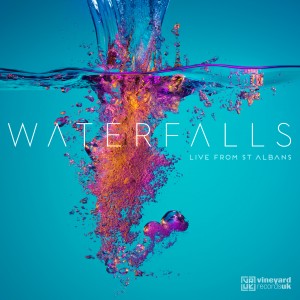Vineyard worship music is having a moment

Worship has always been central to the theology of the Vineyard movement. Some would say that the charismatic worship for which the movement is known runs the risk of having an over-emphasis on experience. But John Wimber, one of the movement's founders who was himself a musician, repeatedly stressed that worship isn't about us but about God – not "getting something" from worship but us giving to God because he is worthy of our praise.
The movement's record label Vineyard Music was set up in the US in 1985, and the UK branch Vineyard Records in 1998. The albums produced in the late 90s set the tone not just in Vineyard churches but for contemporary Christian music across the US and Europe. The songs on the 'Come Now is the Time to Worship' (1998) and 'Hungry' (1999) albums, particularly their title songs, are some of the most well-known of the following decade. Their success is in part a testimony to the movement's core principles and its approach to worship. The intervening years have witnessed a quieter season, though not without some prominent songs.
But the past couple of years have seen a resurgence of creativity in the music, attributed in part to the development of young people within the movement. St Albans-based worship leader Sam Lane's debut album 'The Fire', released in 2013, was particularly well received, and offered a fresh sound for British Christian music. The two subsequent live Vineyard albums have sought to reflect the down-to-earth approach of the movement in a musically imaginative way. The most recent album, 'Waterfalls', released in January, has a contemporary feel while remaining a useful resource for congregational worship.
The grounding principles that were first iterated by veteran worship leader Brian Doerksen, who Wimber sent to the UK to develop Vineyard's worship here, are still central to the music. Among these is the importance of accessibility. Vineyard is primarily a church planting movement, which means making everything about the church accessible for those who aren't familiar with church and faith. And in a practical sense worship music for church planters needs to be able to be played in the rough and ready context of a small group or a few people meeting in a school hall.

Nigel Hemming, one of the pioneers of Vineyard worship and leader of the Winchester church, says: "We exist for people who don't come to church, who don't yet follow Jesus or people whose lives are a mess and they need to connect with him, so if we're playing music that's completely inaccessible, either because it's very bad or because it's very slick and polished and not very real, or just too much like a show, then people won't be able to enter in."
Although there was a significant amount of pre-production on this album, perhaps unusual for a live recording, the songs are still deconstructed and road-tested for playability, even for the unconfident acoustic guitarist.
Somewhat rarely for a vision statement, the record label's strapline "from the church, for the church" is embodied throughout the production process. The songs on 'Waterfalls', as with 'Spirit Burn', the previous live album, were submitted from Vineyard churches across the country. The idea is that the music represents what is going on in worship across the movement. They're not all written by people who spend their days working for the church; one song on the album is written by a carpenter, one of the worship leaders is an educational psychologist. The result is a varied set of tracks that are rooted in real life experience.
Manager Jimmy Cooke says the aim of the album was "to try and capture the national heartbeat and to find musical clothes for those local expressions".
Songs are also put through a theological filter. Theologian and pastor of Riverside Vineyard in Feltham Rick Williams works with the song writing team to ensure not only that the songs are theologically sound, but also that they're things you would want to sing over your local community.
It's not only people's day jobs that keeps the emphasis on real life, but also the supernatural experiences that have always been a prominent part of Vineyard's ministry. "I don't think I could lead worship effectively if did not have a lifestyle of doing the stuff we talk about in our local community," says Dana Masters, a jazz singer and one of the worship leaders on the 'Waterfalls' album.
"It's crazy but it's normal for us to experience people outside the church getting healed from things, because we take the risk and say 'Can I pray for you? We believe that God heals today.' Without that narrative what I feel like what I bring into the corporate worship setting becomes stale," Masters says.
The movement's worship leaders stress that the aim is to develop intimacy with God through the music and have an expectation that the Holy Spirit will "show up" during a time of worship.
"Time and time again people say that 'I came to your church and I experienced something in your worship' and I know that isn't just a warm fuzzy feeling because everyone's being nice to each other," says Hemming. "The way that we worship is geared up to make that happen – not to manipulate anything but just to set it up so that there's an expectation that God will be in the room."
Charismatic worship is often accused of hyping people up into a particular atmosphere; that any spine-tingling moments are merely the result of the right conditions – low lights, emotional music and a soaring chorus.
Although Cooke admits that when working on the latest album they took inspiration from a range of emotionally engaging songs, it seems there is a genuine attempt within the Vineyard to demonstrate that the presence of the Holy Spirit in worship isn't something that's 'produced'.
In a 1995 interview with ABC News before his death, Wimber was asked whether he was totally convinced that everything that happened in their meetings was the Holy Spirit at work. Wimber responded: "No, I'm largely convinced that it's the Spirit. But I believe that it's a mixture of humanity and Spirit."
"There's always the possibility that somebody could just be going along with it emotionally," explains Hemming. "The way that we do things, we deliberately try to avoid that [happening]... My job as a worship leader or a pastor... is to make a space or create a climate where people can meet with God.
"So I lead them in there and facilitate something happening – sometimes songs and music are a really good way, sometimes it's words or art, sometimes it's just silence or the Bible. When I say the Holy Spirit 'shows up', I mean there's a sense for the individual and maybe corporately that we have experienced something more than just ourselves."
Cooke recalls a worship training session in which the Vineyard UK and Ireland directors John and Eleanor Mumford were teaching people on praying for the presence of the Holy Spirit. During the session they asked for the lights to be switched on and told the band not to play.
Cooke says: "It was like they were doing everything physically possible to make sure that anything that was going to happen in the room once we had invited the Holy Spirit to increase his presence there, we knew that it really was the Lord, and not just something that was happening from the stage.
"It was such a low-hype environment, and yet the Lord really ministered to people and it was really very profound. It's something that don't see that happen a lot these days, but personally I love that."
The movement's leaders recognise that worship leaders aren't just people who stand up with a guitar occasionally, especially when sung worship often constitutes about a third of the time we spend in church. As in many churches, Vineyard places a high value on the integrity of their worship leaders and try to develop character in their young people.
Masters, who didn't grow up in the Vineyard movement, expresses a respect and regard for the worship leaders who have been taught about these principles from their youth, not because it's an elite club, but it's clear that the principles that these young worship leaders and producers have been taught rubs off on the music they make.
"The one thing that I keep learning as a worship leader when I'm watching them lead, is that it's not the hype, it's about the Spirit, it's about worshipping Jesus in Spirit and truth," says Masters. "No matter... how cool things get, at the end of the day what you feel at the core of is that this is really about Jesus."











